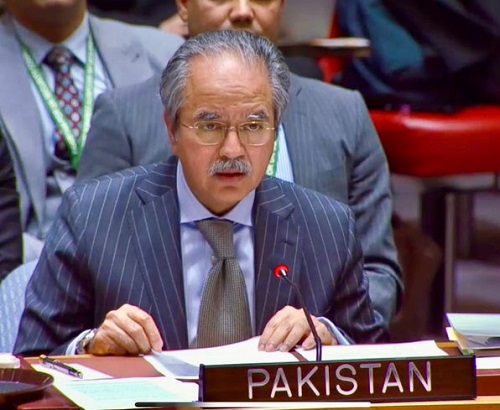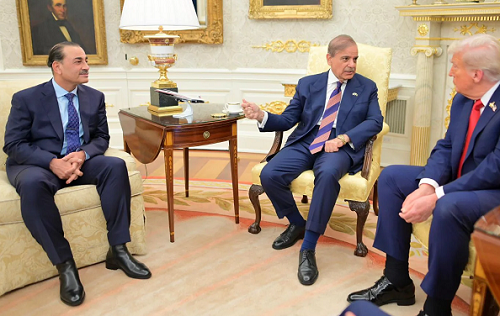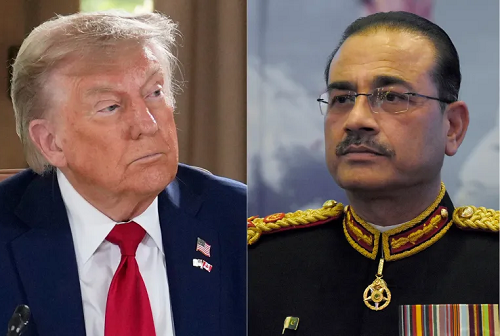Syed Jawed Anwar
MUSLIMS have requested that blasphemy (ridiculing, insulting, disgracing) against Prophet Muhammad, Jesus, Moses, Abraham, and other Messengers of Godï·º be made a punishable crime, a felony. UN should declare it a crime and ask every nation to make laws to control it. Muslims have been crying about this for a long time but are still unheard of.
Imran Khan, the newly elected PM of Pakistan, said in his speech in Senate on August 27 that the West doesn’t realize how any blasphemous incident hurts Muslims’ sentiments. Mr. Khan pointed out the double standard of the West while giving the example of the Holocaust and how four European countries have jail sentences for “anyone who even reinterpret and even challenge the (Jewish given) figures of Holocaust. That is because they realized that this is something that hurts the sentiments of the Jewish community.”
“We need a policy for this matter so that people do not repeatedly hurt our sentiments,” Imran Khan said. Pakistan's Senate unanimously adopted a resolution condemning blasphemous cartoons in the Netherlands.
The next day, Pakistan’s Foreign Minister Shah Mehmood Qureshi Foreign contacted his Dutch counterpart and raised the issue of blasphemous caricatures. Shah told the Dutch foreign minister sacrilegious caricatures had hurt the sentiments of Muslims across the globe.
The following message is going viral on social media from Muslims around the globe:
“When you attack black people, they call it racism. When you attack a country, they call it terrorism. When you attack homosexuality, they call it intolerance. When you attack women, they call it gender discrimination. When you attack Jews, they call it anti-Semitism. But when they attack Holy Prophet Mohammad (PBUH), they call it freedom of speech.”
To protect not being reviled by non-Muslims, Allah asked Muslims in Quran:
“Do not revile those whom they invoke other than Allah, because they will revile Allah in ignorance out of spite” (Al-Quran 6:108).
Muslims can tolerate any oppression of them, their family, and their children and deprivation of all the amenities of life and this world. And they have been tolerating for long and everywhere. Their nations have been bombed, destroyed, occupied, and millions were forced to leave their homes worldwide. But they never overreacted. But whenever someone insults Prophet Muhammad (peace be upon him, the most beloved person of Muslims), they always react, get revenge, and be ready to get even. They can’t control their sentiments.
The word “tolerance” doesn’t apply here. Enough will be enough. It has been proven in history again and again. Whenever someone dishonoured and insulted Prophet Muhammad ï·º, Muslims always first tried to convince them not to do that. But if they didn’t abstain and ignored the collective demand of Muslims, some young blood came forward and scored. In the non-Muslim world, the courts convicted and hanged them, but in the eyes of Muslims, they were always veterans and martyrs.
Reasons:
- True Muslims love Prophet Muhammadï·º more than themselves and their family and parents. Their hearts are full of extreme intimacy for the Prophet ï·º.
- After Prophet Muhammad ï·º Muslims are the torch bearers of Allah’s Guidance till Qiyamah (the last day), and Prophet Muhammad ï·º is the source of Guidance for all human beings. He is the only hope for humanity to get success hereafter. Therefore, Muslims feel an obligation to protect and preserve the life and dignity of the last and final Prophet ï·º.
- Insulting Prophet Muhammad ï·º means inflicting pain on the souls of Muslims. When souls react, the reactions are severe.
- Muslims feel it is their obligation to get revenge and be part of the will of God.
- Muslims fear that if blasphemy is allowed publicly, and if they (Muslims) will not do anything in defence, God’s wrath will engulf them and the whole world. So they feel obligated to protect all humanity by punishing the person involved in blasphemy.
“Allah and His angels bless the Prophet. Believers invoke blessings and peace on him. Verily those who cause annoyance to Allah and His Messenger; Allah has cursed them in this world and in the Hereafter and has prepared for them a humiliating chastisement” (Al-Quran 33:56-57).
“A painful punishment lies in store for those who cause distress to the Messenger of Allah” (Al-Quran 9:61).
“Tell them, (O Prophet): “If your fathers and your sons and your brothers and your wives and your tribe and the riches you have acquired and the commerce of which you fear a slackening, and the dwellings that you love, if they are dearer to you than Allah and His Messenger and strive in His cause, then wait until Allah brings about His decree. Allah does not guide the evil-doing folk” [Al-Quran, Surah At-Taubah 9: 24].
It is reported on the authority of Anas b. Malik (r.a.) that the Messenger of Allah said: “None of you is a believer till I am dearer to him than his child, his father and the whole of mankind.” 1
Few examples of love:
- Once, Abu Bakr R. A., the closest companion of Prophet Muhammad, ï·º said with the sentiments of extreme love that he loved the beloved of God even more than God. He was the companion of Prophet Muhammad ï·º in the most dangerous life-threatening migration from Makkah to Madinah.2
- On the night of migration from Makkah to Madinah, young Ali (RA) was ready to sleep on his bed, knowing the danger to his life. There was a tight blockade of the Prophet’s home by Quraish on the night of migration.3
- Usman Ghani (RA) was never ready to do Tawaaf of Kaaba without Prophet Muhammad ï·º 4
- In the battle of Uhud, Prophet Muhammad’s one tooth was martyred. When a lover of Prophet Muhammad, Owais Qarni, heard the news, he broke all of his teeth in Prophet’s love because he didn’t know what exact tooth was broken. 5
- A companion of Prophet Muhammad had been watching Prophet Muhammad ï·º continuously without distracting his eyes even for a moment. Someone asked him why he was doing so. He responded that he felt relaxed and calm in the eyes and heart when he saw him.6
- Ibn Ishaaq narrated about a woman from the tribe of Bani Dinar of Ansar whose husband, father, and brother were martyred in the battle of Uhud. When their deaths were announced, she said, “How is Allah’s Messenger ï·º?” They said: “Well indeed. O mother of so-and-so. Thanks to Allah; he is well and as good as you desire.” She said: “Let me see him.” They pointed at him. Seeing Prophet Muhammad (s.a.w.), she said, “All grieves are nothing to me so long as you are safe.” 7
- “On the Day of Uhud, The Messenger of Allah said, ‘Who will bring me news of Saad ibn al-Rabi al-Ansari?’ A man said, ‘Me, Messenger of Allah!’ So the man went around among the slain, and Saad ibn al-Rabi said to him, ‘What are you doing?’ The man said to him, ‘The Messenger of Allah ï·º, may Allah bless him and grant him peace, sent me to bring him news of you.’ He said, ‘Go to him, give him my greetings, and tell him that I have been stabbed twelve times and am mortally wounded. Tell your people that they will have no excuse with Allah if the Messenger of Allah (may Allah bless him and grant him peace), is slain while one of them is still alive.’” 8
Examples of revenge:
At the moment of victory and conquer of Makkah, Prophet Muhammad ï·º forgave all his arch enemies. His mercy and forgiveness showered on his foes. Every attempt was made to grant pardon to the people. However, those who ridiculed the Prophethood were not forgiven. “Shedding blood of nine of the worst criminals was declared lawful even under the curtains of Al-Kaaba (some of them later pardoned). Abdul-Uzza bin Khatal was found holding on to the curtain of the Kaaba and was killed.” 9
Ibn Khattal had been used to listening to satirical poems against Prophet Muhammadï·º from his slave women. Once, he pretended to accept Islam, living in Madinah, killed one innocent Muslim and joined pagans of Quraish again.10
It is important to note that no one was killed inside Kaaba except the criminals of blasphemy.
In the light of the Qur’an and Sunnah, it is Ijma (consensus) of Sahaba (Companions of Prophet Muhammad ï·º), and all the Islamic scholars from the very beginning are that punishment of the crime of blasphemy is the death sentence. At the time of Prophet Muhammad ï·º, if someone were pardoned after blasphemy of the Prophet due to the mercy and extreme kindness of Prophet Muhammad ï·º, that doesn’t apply to his Ummati (followers, believers).11
When Abu Bakr (RA, the first Khalifa of the state after Prophet Muhammad ï·º ) received the news that a woman’s teeth were taken out by one of his chiefs of his ruling area in the crime of ridiculing Prophethood, he said that he would order for a death sentence if she were not already punished.12
All the Fuqhah (four Jurisprudence traditions of Islam) --Imam Abu Hanifa, Imam Shafi’i, Imam Malik, and Imam Ahmed Bin Hanbal-- agree that the punishment of blasphemy of the Prophet is the death sentence. Imam Ibn Taymiyyah ruled capital punishment for the crime.
In Islamic history and Muslims’ dominance of a significant part of the world, no one dared to do blasphemy against the Prophet Muhammad ï·º. Everyone (person and nation) knows that Muslim rulers will take revenge if they insult Prophet Muhammad ï·º.
Historians write that background of the Crusaders’ war was also the same: Reginald Châtillon (b.1125 – d. 1187), with his force, tried to attack Arab Peninsula to occupy Madinah and Makkah. After humiliating defeat by Muslim forces, he didn’t stay silent. He had constantly been conspiring against Muslim states, looting and enslaving Muslim traders and passing derogatory remarks against Prophet Muhammad ï·º. When Sultan Saladdin Ayyubi (b. 1137 – d. 1193) came to know about his activity, he swore to Allah to fight and kill him. Sultan fulfilled his pledge.
No one in the world could involve in this heinous act, even in the last days of Khilafat e Osmania of Turkey that fell in 1924. His last ruler Sultan Abdul-Hamid warned France against a blasphemy incident in France, and France took it seriously and stopped to make it happen. In the colonial period, when most of the Muslim countries were occupied, the incidents of blasphemy increased with the backing and encouragement of the new occupying Western powers. Most of the incidents happened in British-occupied India.
- Hadith; Sahih Muslim, 44b, Book 1, Hadith 76
- Allah aur Rasool Ke Shaheed (Urdu)
- Ar-Raheeq Al-Makhtum (The Sealed Nectar)
- Allah aur Rasool Ke Shaheed (Urdu)
- Allah aur Rasool Ke Shaheed (Urdu)
- Allah aur Rasool Ke Shaheed (Urdu)
- Ar-Raheeq Al-Makhtum (The Sealed Nectar)
- Muwatta Malik, USC-MSA web (English) reference: Book 21, Hadith 41, Arabic reference: Book 21, Hadith 1001)
- Ar-Raheeq Al-Makhtum (The Sealed Nectar)
- Allah aur Rasoolï·º ke Shaheed, Urdu
- Allah aur Rasoolï·º ke Shaheed, Urdu
- Allah aur Rasoolï·º ke Shaheed, UrduTo be continued.
----------------------------------------------
ARTICLE- 2
ARTICLE -3







